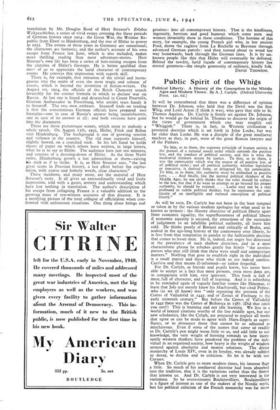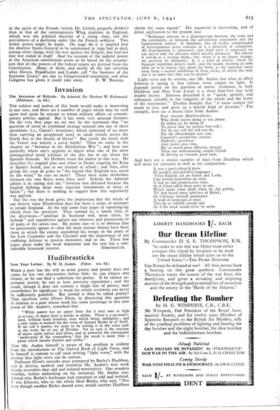Public Spirit of the Whigs
IT will be remembered that there was a difference of opinion between Dr. Johnson, who held that the Devil was the first Whig, and Lord Acton (I think it was), who gave that title to St. Thomas Aquinas. Dr. Carlyle is firmly set against Dr. Johnson, but he would go far behind St. Thomas to discover the origin of the views of government which one may roughly call " Whiggish." There is, in fact, in Western civilisation a perennial doctrine which is set forth in John Locke, but was far older than Locke. He was a disciple of the great mediaeval teachers as they, in part, were of the great Roman lawyers and of the Fathers.
To him, as to them, the supreme principle of human society is the pursuit of a rational moral order which controls the positive law, and the conduct of political society, and this is what the mediaeval thinkers meant by justice. To him, as to them, it was the community which was the source of all positive law, of all political order ; and all political authority, whether legislative or executive, is derived from, or delegated by, the community. To him, as to them, this authority must be embodied in positive laws.. . . And finally, like the normal political thinkers of the Middle Ages, he not only thinks that the ruler should be subject to the law, but that if he were to attempt to go beyond his proper authority, he should be resisted. . . . Locke may not be a very profound or subtle political thinker, but he represents the con- tinuity of an intelligible and rational conception of political liberty."
As will be seen, Dr. Carlyle has not been in the least tempted or taken in by the various modern apologies for what used to be known as tyranny : the illusory character of political liberty apart from economic equality, the superfluousness of political liberty if economic equality is secured, the attractions of the surrender of judgement to an infallible political authority, all leave him cold. He thinks poorly of Bossuet and critically of Bodin, and, soaked in the age-long history of the controversy over liberty, he is free from that temptation to pander to the fashionable doctrine that comes to lesser men. He is, indeed, not angry but distressed at the prevalence of such shallow doctrines, and in a most characteristic phrase he rebukes gently but firmly " the careless person who may still think that these were small and unimportant matters." Nothing that goes to establish right in the individual is a small matter and those who think so are indeed careless. Careless and that means ill-informed—or rather forgetful.
For Dr. Carlyle, as friends and pupils know, has never been able to accept as a fact that most persons, even most dons are, in comparison with him, very ignorant. This book is full of meat, full of character, and full of learning. And it is refreshing to be reminded again of vaguely familiar names like Hincmar, to learn that Joly not merely knew his Machiavelli, but cited Pybrac, who (as we all know) was " only repeating the protests of the Cortes of Valladolid in 1442, and of -Zasius of Freiburg in the early sixteenth century." But before the Cortes of Valladolid in 1442 there was the Cortes of Bribiesca in 1387. (Did that catch you out?) This is learning and not idle learning. We live in a world of textual citations worthy of the late middle ages, but our new scholastics, like the Caliph, are prepared .to neglect all books that agree or can be made to agree with Marx-Engels as super- fluous, or to denounce those that cannot be so adjusted as mischievous. Even if some of the names that come sd readily to Dr. Carlyle's pen might mean little to us, and add little to our knowledge, the very weight of learning reminds us how inces- santly western thinkers have pondered the problem of the indi- vidual in an organised society, how heavy is the weight of wisdom arrayed against absolutist and monist solutions. The divine monarchy of Louis XIV, even in its heyday, was already subject to decay, to decline and to criticism. So let it be with our Caesars.
When Dr. Carlyle gets to more modern times, his interest flags a little. So much of his mediaeval doctrine had been absorbed into the tradition, that it is the variations rather than the theme that interest us. And Dr. Carlyle is not very interested in the variations. So he overestimates Boulainvilliers. Boulainvilliers is a figure of interest as one of the makers of the Nordic myth, but his political criticism of the French monarchy was far more
in the spirit of the Fronde (which Dr. Carlyle properly dislikes) than in that of the contemporary Whig tradition in England, which was the political doctrine of a rising class, not the peevishness of a declining order like the French noblesse. Two minor points might be made. On page 66 it is implied that the abortive States General to be summoned in 1649 had to deal, among other things, with the war against the Empire, but had not that war ended in 1648? And the account of the judicial power in the American constitution seems to be based on the assump- tion that all the powers of the federal courts are derived from the Constitution. Many of them, and nearly all the law covering what Messrs. Frankfurter and Landis call "the business of the Supreme Court," are due to Congressional enactment, and what Congress has given it could take away. D. W. BROGAN.



























 Previous page
Previous page